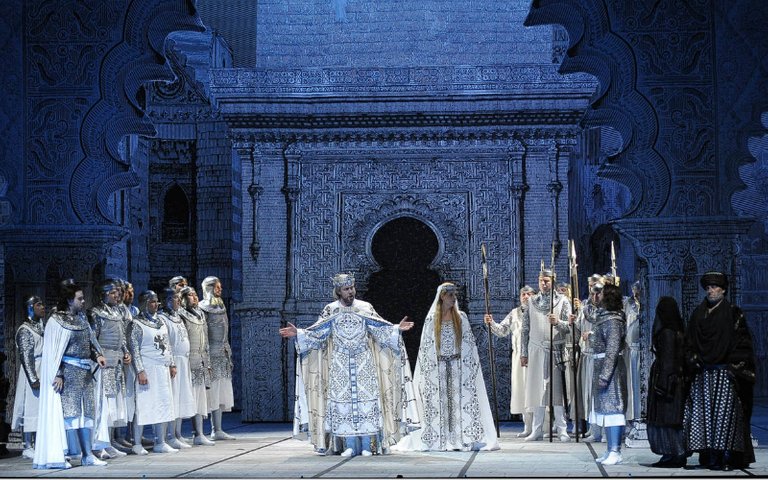Ha! Didn't know that Franz Schubert wrote any opera, did you? Well, neither did I!
This 1823 three-act opera is set to a libretto by Josef Kupelwieser after 'Buch der Liebe' by Büsching, von der Hagen, and 'Eginhard und Emma’ by de la Motte Fouqué. It was premiered in Karlsruhe, Germany in 1897.
The story is set during the reign of Charlemagne (King Karl) as the Christians battle the Moors in the Saracens Wars. Fierrabras, the son of the Moorish Prince Boland, is captured by King Karl’s knight, Roland (AKA Orlando in many Italian operas). He promptly falls in love with Emma, King Karl's daughter... though she only has eyes for her father's gallant knight, Eginhard. However, during an emissary mission, Eginhard, Roland, and other Christian knights are captured and taken to Boland's palace, where they are condemned to death... But not promptly enough to prevent Boland's daughter, Florida, and Roland from making eye contact and become romantically smitten with each other. With the help of Florida, the Christian knights launch an escape attempt, but only Eginhard makes it back to France. In a chivalrous act of selfless love, Fierrabras accompanies Eginhard back to Boland's court to liberate the others. King Karl and Boland agree to a peace. Eginhard is reunited with Emma as Roland is with Florida. Only the unmatched (in more ways than one) Fierrabras remains free to date another day.
This is a Singspiel, with spoken German dialog connecting musical numbers. Schubert somehow managed to keep the transition between the spoken part and the musical part of the show quite smooth, however. The music is melodic, and the arias are more songlike than operatic (after all, Schubert is best known for his German art songs). To say that the composer was heavily influenced by Beethoven is an understatement. Opera fans might listen to this music and wonder if Schubert didn't have Fidelio ringing in his ears a bit too much as he penned this opera.
CAST:
Boland (Moorish Prince) ::: Günther Groissböck (bass)
Fierrabras (Boland's son) ::: Jonas Kaufmann (tenor)
Florida (Boland's daughter) ::: Twyla Robinson (soprano)
King Karl (Charlemagne) ::: László Polgár (bass)
Emma (his daughter) ::: Juliane Banse (soprano)
Eginhard (Christian knight, Emma's lover) ::: Christophe Strehl (baritone)
Roland (Christian knight) ::: Michael Volle (baritone)
Franz Schubert (the opera's composer) ::: Wolfgang Beuschel (speaking part)
Franz Welser-Möst/ Orchestra and Chorus of Zurich Opera
Claus Guth ::: Stage Director
Claus Guth's staging is, as in his Iphigénie en Tauride, very abstract... So if you are those who despise Eurotrash staging, you'll probably find this production a tough pill to swallow. If you enjoy the conceptual staging that challenges you to think a lot while watching the performance and revel in figuring out the director's hidden messages, however, you'll find it fascinating. The set by Christian Schmidt is minimalistic, but colorful and heavily symbolic... opening in a very bare piano room, where Franz Schubert himself (played by the actor Wolfgang Beuschel) is directing the performance. He acts his part well from start to finish, though I must admit that I find his character's inclusion into the opera an annoying distraction (especially when he cuts in to begin the real characters' spoken dialog). It seems that when Schubert dislikes how the performance is going, he'd run to take cover behind a stage prop (usually a chair)... which arouses an evil desire in me for the composer to be annoyed more often in the course of the performance.
On the music front, if you manage to ward Morpheus off beyond the first 26 minutes of the opera, it gets to be more engaging thereafter. This is no fault of the performers,... Schubert wasn't known for his operas for good reasons. Franz Welser-Möst seems to really like this music, though, and drives the orchestra forward just about as passionately as is possible while giving his singers good support.
Jonas Kaufmann, in the (amazingly short) title role of Fierrabras, presents additional evidence to his overwhelmingly sticky label as one of the most versatile tenors in the business. He doesn't have a lot of stage time, but makes every second of it count. The voice itself is beautifully warm and lyrical, though convincingly heroic when the situation calls for. László Polgár is a dominant presence as King Karl, whose regal look and bearing are complimented by an authoritatively solid bass voice. Juliane Banse's Emma is not in good voice, but soldiers on with dignified determination (and good acting). Twyla Robinson is a vocally fetching Florida. Christoph Strehl and Michael Volle don't look very tough but sing gallantly and act well as Eginhard and Roland. Günther Groissböck is a very young looking Boland who acts passionately, though his light voice tends to get covered by the orchestra.
This is essentially an ensemble opera, and the singers, chorus, and orchestra work together very well to bring the most out of the music. I'm not convinced that Fierrabras deserves to be resurrected more often. I don't recommend it for those who are new to classical music in general, though hard-core opera fans should hear this work at least once.



Congratulations @devoran! You have completed the following achievement on the Hive blockchain and have been rewarded with new badge(s) :
You can view your badges on your board and compare yourself to others in the Ranking
If you no longer want to receive notifications, reply to this comment with the word
STOPDo not miss the last post from @hivebuzz:
Thanks!
Support us back and vote for our witness.
You will get one more badge and bigger upvotes from us when we notify you.
Done. Thank you so much!